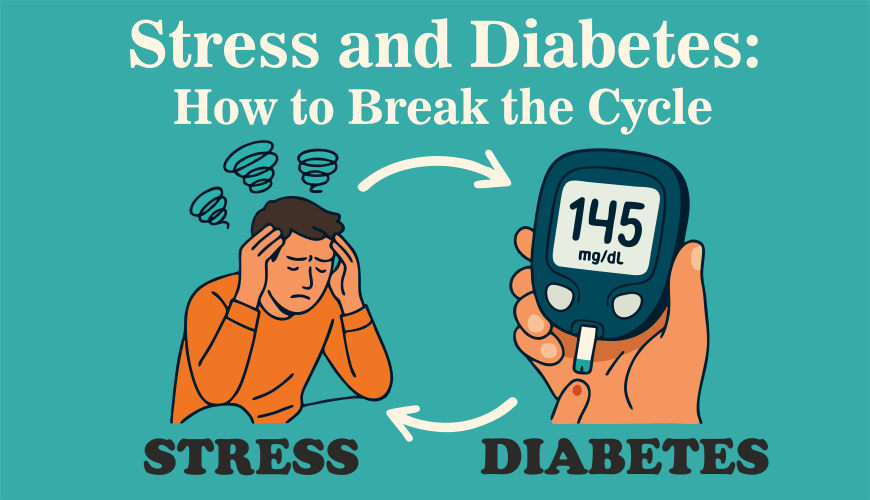
Living with diabetes presents daily challenges, and when compounded by chronic stress, it creates a dangerous cycle that can derail effective management. Understanding how stress impacts blood sugar and implementing strategies to counter it is essential for those seeking long-term wellness and metabolic balance.
Understanding the Connection Between Stress and Diabetes
When the body experiences stress, it releases cortisol and adrenaline, two hormones that increase blood glucose to prepare for rapid action. While this is a normal biological response, individuals with diabetes face an impaired ability to manage these glucose surges.
Research shows that chronic stress increases insulin resistance and inflammation, two central factors in the progression of diabetes (Lloyd et al., 2005). In addition, stress can lead to behavioral changes such as poor eating habits, lack of physical activity, and inadequate sleep—all of which exacerbate blood sugar imbalances.
Key Effects of Stress on Diabetes
Elevated Cortisol Levels: Long-term stress keeps cortisol high, leading to persistent hyperglycemia (Joseph & Golden, 2017).
Poor Glucose Utilization: Stress hormones interfere with the action of insulin, reducing the body’s ability to use glucose effectively.
Emotional Disturbances: Anxiety and depression often co-occur with diabetes and can impair self-care practices (Gonzalez et al., 2008).
Recognizing Signs of Stress in People With Diabetes
Stress manifests in both physical and emotional ways. People living with diabetes should be aware of:
Inconsistent blood glucose levels
Difficulty concentrating
Mood instability
Fatigue and sleep disturbances
Increased appetite or loss of appetite
Physical symptoms such as headaches or muscle tension
These warning signs indicate that stress is impacting diabetes management and needs to be addressed.
Strategies to Break the Stress-Diabetes Cycle
1. Integrate Mind-Body Practices
Mindfulness and relaxation techniques offer significant benefits for both mental health and glycemic control. Techniques include:
Meditation: Lowers cortisol levels and improves insulin sensitivity (Rosenzweig et al., 2007).
Deep breathing: Activates the parasympathetic nervous system to reduce stress.
Yoga: Enhances flexibility and reduces blood glucose levels through physical and emotional regulation (Innes et al., 2005).
2. Build a Healthy and Predictable Routine
Having a structured daily plan helps reduce stress triggers:
Set consistent meal and medication times
Sleep for 7–9 hours per night
Block out time for exercise and relaxation
Limit screen time before bed
Consistency creates a sense of stability and supports optimal glycemic management.
3. Eat to Regulate Mood and Blood Sugar
Certain foods help reduce stress while supporting healthy glucose levels:
Magnesium-rich foods: Reduce cortisol and support nerve function (e.g., leafy greens, seeds)
Whole grains and legumes: Stabilize blood sugar and reduce inflammation
Fatty fish and flaxseeds: Provide omega-3s that support brain and heart health
Avoid:
Sugary snacks that cause sharp glucose spikes
Excess caffeine, which can increase cortisol
Alcohol, which disrupts sleep and glucose metabolism
4. Engage in Regular Physical Activity
Exercise is a proven way to relieve stress and improve blood glucose regulation. Aim for:
150 minutes per week of moderate aerobic exercise (e.g., brisk walking)
Two sessions of strength training
Yoga or tai chi for mental clarity and flexibility
Exercise increases endorphin levels, enhances insulin sensitivity, and improves mood (Colberg et al., 2016).
5. Strengthen Your Support System
Emotional resilience is easier with a reliable support network:
Talk openly with trusted friends and family
Join diabetes support groups (in-person or online)
Seek professional counseling if stress becomes unmanageable
Work with a diabetes educator to learn coping strategies
Emotional support has been linked to improved self-management and metabolic outcomes in people with diabetes (Fisher et al., 2007).
Collaborating With Your Healthcare Team
Diabetes care must address both physical and emotional health. Your healthcare team can help you:
Adjust medications based on stress-related glucose changes
Access behavioral therapy or psychiatric support
Get nutrition counseling tailored to your needs
Don't hesitate to communicate openly with your care providers about how stress is affecting your condition.
Long-Term Rewards of Breaking the Cycle
Taking control of stress in diabetes yields measurable long-term benefits:
Lower A1C levels
Reduced cardiovascular risk
Better mental health and mood stability
Decreased risk of complications
Improved quality of life
With commitment and the right strategies, it is possible to regain balance, improve health outcomes, and lead a fulfilling life with diabetes.
References
Colberg, S. R., Sigal, R. J., Fernhall, B., Regensteiner, J. G., Blissmer, B. J., Rubin, R. R., ... & Braun, B. (2016). Exercise and type 2 diabetes: the American College of Sports Medicine and the American Diabetes Association joint position statement. Diabetes care, 39(11), 2065–2079. https://doi.org/10.2337/dc16-1728
Fisher, L., Chesla, C. A., Skaff, M. M., Gilliss, C., & Kanter, R. A. (2007). Psychological and family functioning among patients with diabetes: the importance of context. Journal of Consulting and Clinical Psychology, 75(1), 148–158. https://doi.org/10.1037/0022-006X.75.1.148
Gonzalez, J. S., Peyrot, M., McCarl, L. A., Collins, E. M., Serpa, L., Mimiaga, M. J., & Safren, S. A. (2008). Depression and diabetes treatment nonadherence: a meta-analysis. Diabetes Care, 31(12), 2398–2403. https://doi.org/10.2337/dc08-1341
Innes, K. E., Bourguignon, C., & Taylor, A. G. (2005). Risk indices associated with the insulin resistance syndrome, cardiovascular disease, and possible protection with yoga: a systematic review. The Journal of the American Board of Family Practice, 18(6), 491–519. https://doi.org/10.3122/jabfm.18.6.491
Joseph, J. J., & Golden, S. H. (2017). Cortisol dysregulation: the bidirectional link between stress, depression, and type 2 diabetes mellitus. Annals of the New York Academy of Sciences, 1391(1), 20–34. https://doi.org/10.1111/nyas.13217
Lloyd, C., Smith, J., & Weinger, K. (2005). Stress and diabetes: a review of the links. Diabetes Spectrum, 18(2), 121–127. https://doi.org/10.2337/diaspect.18.2.121
Rosenzweig, S., Reibel, D. K., Greeson, J. M., Brainard, G. C., & Hojat, M. (2007). Mindfulness-based stress reduction lowers psychological distress in medical students. Teaching and Learning in Medicine, 15(2), 88–92. https://doi.org/10.1207/S15328015TLM1502_03
Tags:stress and diabetesdiabetes managementblood sugar controldiabetes lifestylemanaging stresscortisol and blood sugarmental health and diabetesnatural diabetes remediesdiabetes care tipsbreak the stress-diabetes cycle
















Write a comment